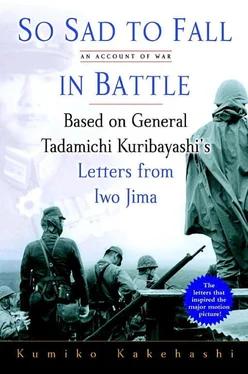The Americans pushed forward steadily. The Japanese did not retreat but defended their positions to the death. Inevitably the battle turned into close-quarters combat, with both sides close enough to make out each other’s faces. The Americans could not provide air support for fear of harming their own side, so they pushed forward with flamethrowers and satchel charges. The Japanese responded by throwing grenades from their subterranean bunkers or sniping with small arms.
As the supply of explosives started to run out, the Japanese were no longer able to destroy enemy tanks in suicide attacks. I saw a photograph where a can of gasoline thought to have been stolen from the Americans lay near the corpses of three Japanese soldiers who had thrown themselves against a tank. It is thought that they made their charge clutching the fuel can in lieu of explosives. One of the soldiers lies on his back. His stomach has been half blown away, but his arms, burned black, are thrust up into the air as if the can were still clasped in his hands.
The Japanese also conducted surprise attacks on the American camps at night. These were not banzai charges, but well-planned operations conducted by small numbers of men. Initially they were effective, but in time the Americans devised countermeasures, and few of the attackers made it back alive.
The underground bunkers echoed with the groans of the wounded and were suffused with the smell of sulfur and the stench of death. The Japanese had no way of burying the men who died in the bunkers and were forced to share their living space with their dead comrades.
Little in the way of food was left, but most excruciating of all was the lack of water. Even when the Japanese were digging the bunkers, before the American invasion, the lack of water had been hard enough to bear, but there had at least been a fixed ration of water, albeit a modest one. Without exception, the oral and written testimonies of survivors all talk about the suffering caused by the shortage of water at this stage.
Hoshino Fujitaka, formerly of the 20th Independent Artillery Mortar Battalion, recalled this time in a letter he sent to the bulletin of the Association of Iwo Jima: “I don’t think I will ever be able to forget the memory of how sweet the rainwater that formed puddles in the tunnels in the night tasted when we got down on all fours to drink it.” There is an old Japanese saying: “Sip on muddy water if you want to stay alive,” but on Iwo Jima even muddy water was felt to be a blessing equal to the sweetest nectar.
Kojima Takatsugi, a survivor from the same battalion, published a memoir in the Yanai Nichinichi Shimbun newspaper in 1968. It contains the following passage:
As we waited for the Grummans to pull out, we used to gather in the entrance to the bunker and talk endlessly about the good old days back home. Our main topics were eating and water. Our battalion was made up of men from Korea [the 20th Independent Artillery Mortar Battalion was composed of Japanese people living in Korea], so we could temporarily slake our thirst by talking about how we’d like to drink a bellyful of the water of Hankou, or discussing things that had to do with water like the Tedong River and the Sambang waterfall.
One soldier suddenly shouted out for us all to come and see. We were thrilled to see that there was dew glistening on the tips of the Japanese pampas grass that was still in the shade. We pressed it to our lips as if in a silent kiss.
In this far from expertly written passage, the phrase “We pressed it to our lips as if in a silent kiss” stands out for its poetic beauty. That is how desperate they were for water. That is how precious fresh water was to them.
The memoir continues:
One soldier got dreadfully down and started whimpering some sort of prayer: if his life—which looked likely to be snuffed out any day—was saved, and by some miracle he was able to return home safely, then he did not need status or fame. If he had to climb up into the clouds, then he would climb up into the clouds; if he had to walk on the seafloor, then he’d do that, too; but more than anything he wanted to get out of this hell on earth, he said.
“Hell on earth”—it wasn’t just the common soldiers who felt that way, as this passage, transmitted to Imperial General Headquarters on March 5 by the chief of staff of the “Courage Division,” makes clear.
The air supremacy of the enemy is absolute and total, sometimes reaching a total of 1,600 planes in a single day. The truth is that from before dawn until nightfall, without even a moment’s pause, they have from twenty or thirty to one hundred or more fighters in the air, strafing us and bombing us relentlessly. The enemy do not just put a halt to our daytime combat activities this way, but the support enables them to safely come up close, protected by tanks, and insolently penetrate those points where we are short of men.
On our side, we are almost unable to respond as our artillery and heavy armaments have all been destroyed. In the present situation, all we can do is engage the enemy—who is always our superior in terms of material—with small arms and with hand grenades in a succession of difficult battles.
My battle report ends here. And from this living hell which completely surpasses imagination, I take the liberty of sending in my report as it is, although it may appear that I am merely whining. [Emphasis in the original.]
It is unusual to describe battle conditions as a “living hell” in a “war-lesson telegram,” but by this time there was no one left alive on Iwo Jima who did not think of the place as hell. Reading the last emphasized sentence you seem to hear all the surviving soldiers crying out to you.
The chief of staff may have been the one who sent this message, but as commander in chief Kuribayashi approved all the telegrams transmitted from Iwo Jima. Extreme though the text of this particular telegram may be, it nonetheless expresses Kuribayashi’s personal intent. He tried to give the Imperial General Headquarters a taste of what things were really like on the island they had written off, the island they had ordered him to defend to the end at a cost of more than twenty thousand Japanese lives.
To never complain. To never indulge in self-pity. To take whatever was thrown at you and to die in stoic silence. That was the proper conduct for a military man of the time. But Kuribayashi did not want to play by those rules.
KURIBAYASHI PROVIDED FAITHFUL REPORTS of the shifting tides of battle in his war-lesson telegrams. The Japanese expected that Americans would invade Taiwan and Okinawa after Iwo Jima. In an effort to help with their defense, Kuribayashi tried his best to form an accurate idea of enemy numbers while offering observations and analysis of the Americans’ strategy and tactics.
A comparison of Kuribayashi’s reports with the American military records published after the war shows that he had an accurate grasp of the damage the Americans had sustained. On March 2, for example, Kuribayashi estimated American casualties at around twelve thousand, with about two hundred tanks and about sixty planes lost. His estimates are only around 10 percent above the correct figures.
Throughout the Pacific War, the Japanese commanders had a tendency to interpret the war in a way that was flattering for them. Kuribayashi was different: he was able to face the facts, calmly and head-on.
Kuribayashi sent his last war-lesson telegram on March 7. The longest telegram to be sent from Iwo Jima, it is unique in two respects.
First, it is addressed to Hasunuma Shigeru, chief aide-de-camp to the emperor. Hasunuma had been a professor of military science when Kuribayashi was at the Army War College, and was also a fellow cavalryman.
Читать дальше












